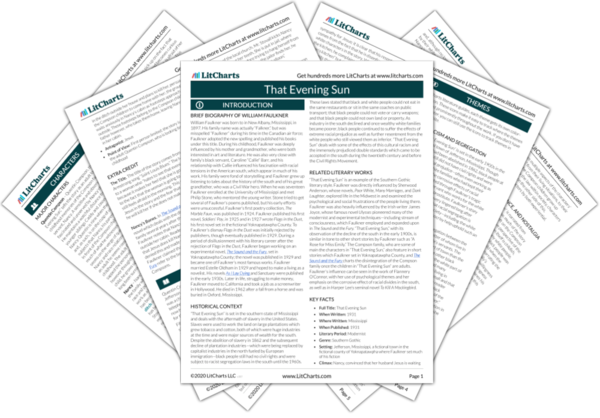The ditch outside Nancy’s cabin becomes of symbol of the racial divide between the black and the white characters in the story. The ditch literally marks the divide between the part of the town where the white people live and “Negro Hollow” where black characters like Nancy and Dilsey live. “Negro Hollow” is much poorer than the white part of the town, a result of intense racial prejudice and segregation. Faulkner walks the reader through this contrast when he follows Nancy’s journey carrying the laundry from the “kitchen of the white house” to the “blackened washpot outside a cabin in Negro Hollow.” This description contrasts the comfort of the “white” houses, which have kitchens and servants, with the poverty of the “cabins” in “Negro Hollow,” which do not have kitchens and whose inhabitants work for the white families as servants.
The divide represented by the ditch is, of course, also an ideological one, as the white characters in Jefferson view “Negro Hollow,” on the other side of the ditch, as a proper environment for black people to live. Racial prejudice in the period meant that many white people agreed with segregation laws and felt that black people should not live near or share facilities with white people. The pampered Compson children are warned not to cross this divide, partly because of Jesus, but partly because it is not seen as their place in society. When they visit Nancy’s home, the children are uncomfortable and dislike the smell, suggesting that they have absorbed racist ideas and are too privileged to recognize that Nancy’s poverty and desperation are not her own fault. The fact that Jesus may be hiding in the ditch, waiting to kill Nancy, further suggests that racism is an unspoken and yet ever-present threat to the black characters in Jefferson.
The Ditch Quotes in That Evening Sun
And then about half the time we’d have to go down the lane to Nancy’s cabin and tell her to come on and cook breakfast. We would stop at the ditch, because father told us not to have anything to do with Jesus – he was a short, black man with a razor scar down his face – and we would throw rocks at Nancy’s house until she came to the door, leaning her head around it without any clothes on.

Unlock explanations and citation info for this and every other That Evening Sun quote.
Plus so much more...
Get LitCharts A+“Hush,” Nancy said. She was talking loud when we crossed the ditch and stooped through the fence where she used to stoop through with the clothes on her head. Then we came to her house. We were going fast then. She opened the door. The smell of the house was like the lamp and the smell of Nancy was like the wick, like they were waiting for one another to begin to smell. She lit the lamp and closed the door and put the bar up. Then she quit talking loud, looking at us […] There was something about Nancy's house; something you could smell besides Nancy and the house. Jason smelled it, even. “I don't want to stay here,” he said.
We left her sitting before the fire. “Come and put the bar up,” father said. But she didn't move. She didn't look at us again, sitting quietly there between the lamp and the fire. From some distance down the lane we could look back and see her through the open door. “What, Father?” Caddy said. “What’s going to happen?” “Nothing,” father said. Jason was on father's back, so Jason was the tallest of all of us. We went down into the ditch. I looked at it, quiet. I couldn't see much where the moonlight and the shadows tangled. “If Jesus is hid here, he can see us, cant he?” Caddy said. “He's not there,” father said. “He went away a long time ago.”












